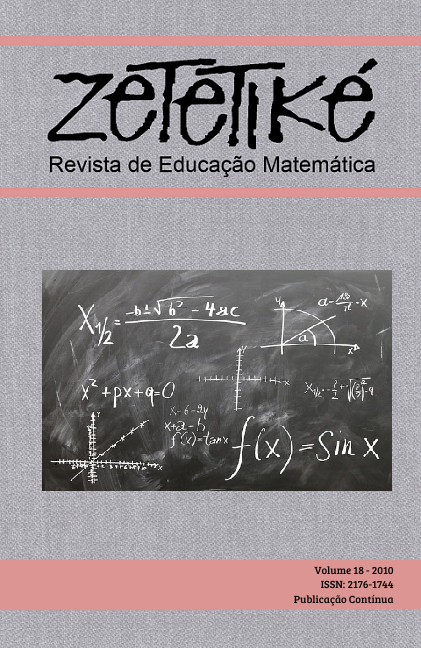Abstract
The purpose of this paper is to explore the functioning of some devices
of this contemporaneity, both philosophical and artistic, that can move a
curriculum of the undergraduate course in mathematics, contributing to teacher
education in this field. It starts with a set of questions: Which assemblages is
Mathematics education able to build in this contemporary world? Which relations are produced in such arrangements of things, ideas and people? How
do they work and link themselves in the multiple languages that they gather?
What do they produce in this combination? The construction of replicas for such
matters is fed by data produced during the teaching practice with eleven
trainees of the mentioned course in regard to the construction, development and
evaluation of teaching and learning projects in public schools.
References
BARROS, Manoel de. O livro das ignorãnças. Rio de Janeiro: Record, 1998.
BECKETT, Samuel. Como é. Tradução de Ana Helena Souza. São Paulo: Iluminuras, 2003.
BRASIL. [Plano Nacional de Educação (2001)]. Apresentado por Ivan Valente. Rio de Janeiro: DP&A, 2001.
CALVINO, Ítalo. Palomar. São Paulo: Companhia das Letras, 1994.
CASTRO, Lisete Barboza de; RICARDO, Maria Manuel Calvet. Gerir o trabalho de projecto. 5. ed. Lisboa: Texto Editora, 1998.
CORRAZA, Sandra Mara. Artistagens: filosofia da diferença e educação. Belo Horizonte: Autêntica, 2006.
DELEUZE, Gilles. Diferença e repetição. Tradução de Luiz B. L. Orlandi; Roberto Machado. Rio de Janeiro: Graal, 1988.
DELEUZE, Gilles. O mistério de Ariana. Tradução de Edmundo Cordeiro. Lisboa: Passagens, 1996.
DELEUZE, Gilles. Foucault. Tradução de José Carlos Rodrigues. Lisboa: Vega, 1998.
DELEUZE, Gilles; GUATTARI, Félix. Mil platôs: capitalismo e esquizofrenia. Tradução de Aurélio Guerra Neto; Ana Lúcia de Oliveira; Lúcia Cláudia Leão; Suely Rolnik. Rio de Janeiro: Ed. 34, 1999. v.3. (Trans.)
DELEUZE, Gilles; GUATTARI, Félix. Mil platôs: capitalismo e esquizofrenia. Tradução de Suely Rolnik. Rio de Janeiro: Ed. 34, 2002. v.4. (Trans.)
DELEUZE, Gilles; PARNET, Claire. Diálogos. Tradução de Eloísa Araújo Ribeiro. São Paulo: Escuta, 1998.
DELEUZE, Gilles; PARNET, Claire. L’ abécédaire de Gilles Deleuze. Entrevista com Gilles Deleuze. Editoração: Brasil, Ministério de Educação, “TV Escola”, 2001. Paris: Editions Montparnasse, 1997. 1 videocassete, VHS, son., color.
GUATTARI, Félix. As três ecologias. 15. ed. São Paulo: Papirus, 1990.
GUATTARI, Félix; ROLNIK, Suely. Micropolítica: cartografias do desejo. Petrópolis: Vozes, 1986.
ROLNIK, Suely. Cartografia sentimental: transformações contemporâneas do desejo. São Paulo: Estação Liberdade, 1989.

This work is licensed under a Creative Commons Attribution-NonCommercial-NoDerivatives 4.0 International License.
Copyright (c) 2014 Zetetiké: Revista de Educação Matemática

